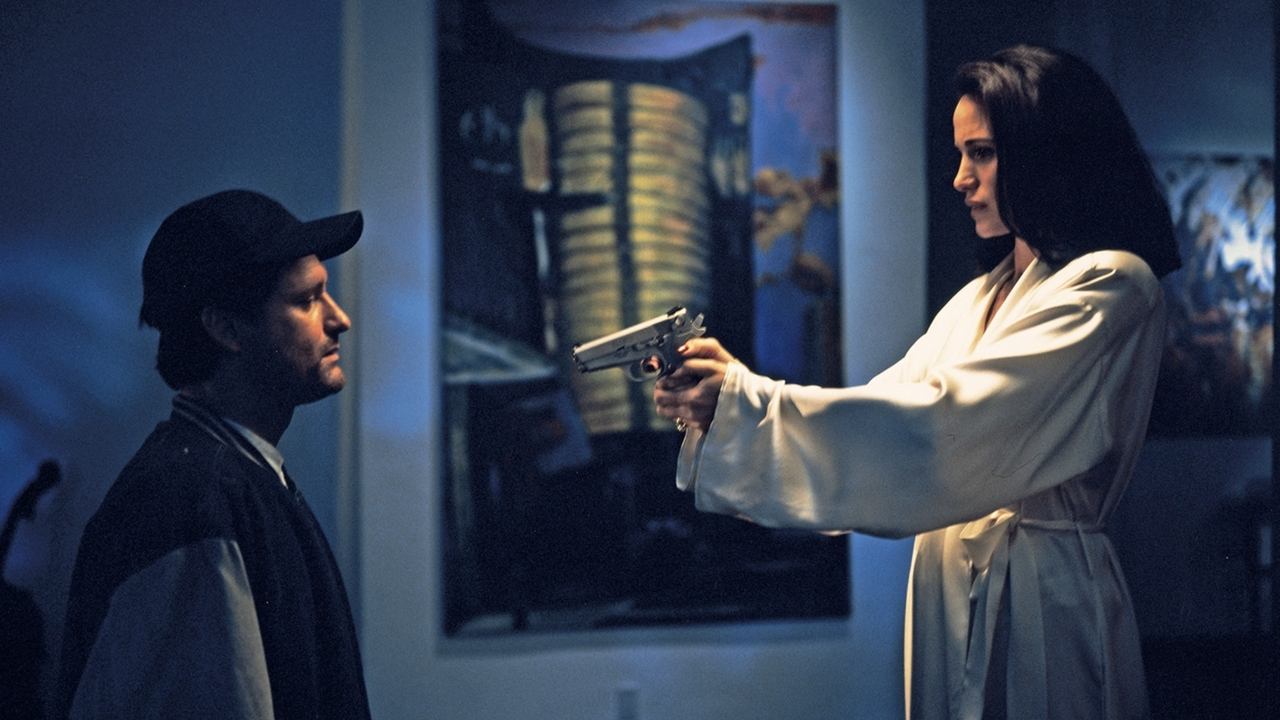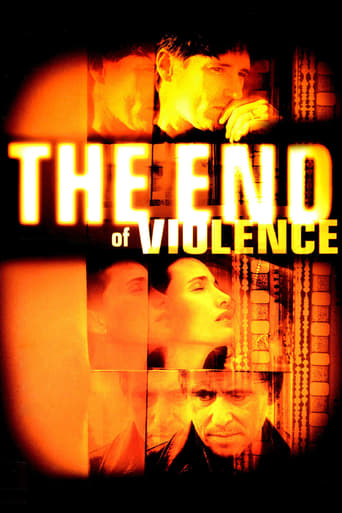TrueJoshNight
Truly Dreadful Film
NekoHomey
Purely Joyful Movie!
Steineded
How sad is this?
ChicDragon
It's a mild crowd pleaser for people who are exhausted by blockbusters.
rixrex
Despite some very fine performances, the whole milieu of this doesn't ring true. As a parable of a sort, it could be acceptable, especially if the setting was a European country, but as set in the US, it is flawed.Wender's image of the US, while the big players in the film industry seem fairly on target, isn't altogether natural. The portrayals of different races is either too stereotypical to be realistic or overly simplistic. It's possible that this is intended as part of the commentary on the how violence can be controlled with the use of violence by the state, accompanied by the loss of privacy and certain liberties. As such, it is still a flaw.Quite believable is Henry Silva as the patriarch of a Hispanic working class family, not believable is his overly meek manner, as is the case with all the others in this group.Still, with the flaws, I'd recommend it for viewing for having a rather thought-provoking premise.
lastliberal
Wim Wenders(Buena Vista Social Club: Paris, Texas) is not for everyone. His films are slow and methodical. They do not hit you hard, but creep along unwinding in layers so that you can savor them like a fine single malt scotch.This film came out before Crash, but it is still that same format. There are many stories going on at once, and they are interconnected.Bill Pullman (Independence Day, The Grudge) is a movie producer (Mike Max) who finds himself in a situation that allows him to change his life. It wasn't such a great life anyway. He was only married to Andie MacDowell (Groundhog Day, Four Weddings and a Funeral). How can a man stand that! But his situation has been observed by a computer scientist that is working on a new tool of Big Brother to watch our every move. Like they don't have that now.There were some very interesting characters floating through the story. This was Traci Lind's last movie (?). She was an actress who lost a job when Max's movie gets shut down, and she runs into him, and she connects with a cop who is pursuing her and working the case, and he connects with the computer geek and well, I said it was all interconnected while separate stories are going on.It's Crash. It's Babel. It's both. It's neither. It's about life. It's about Big Brother. It's about relationships between the races. It's about Hollywood.It's Wim Wenders, so it takes some effort, but it is worth it. It's not about sex and violence: it's about people.Besides that it has Ry Cooder's music.
fedor8
"The End Of Violence"!!! How grand-sounding! Another hopelessly pretentious and clumsily made drama as only Wim Wenders can make it.From all the German directors who ever made it outside the confines of Germany he is easily the worst. At the very beginning he gives us a taste of nonsense to come: Pullman informs us that he went into movie-making because as a child he was afraid(!) of movies (and people in general). First of all, I've never heard of "movie-phobia", and even if such a person existed outside of Wenders's silly fantasy world they would probably end up in a lunatic asylum at best, and not as a successful yuppie. The next nonsense is Byrne telling a friend that the reason he doesn't drive is that he wants to have as little to do with modern technology as possible; meanwhile, he works in an observatory, surrounded by amazing high-tech gadgetry! Driving a car, by comparison, is like living in a cave! This wasn't meant to be Wenders's humour but an attempt to define Byrne as a complex and fascinating character. The attempt failed. After Pullman, the hot-shot producer, more-or-less mysteriously survives the kidnap and attempted murder, he is virtually adopted by a Latino family! And works there as a gardener or something for months to come! Weird, yes, but in a dumb way. All the while it is so obvious that the bald grim-faced guy is responsible for all the nasty goings-on. Then there is the detective who starts his investigation by flirting with a stunt woman(!)-turned-actress and later professes his love to her even though they still barely know each other! After they have sex, she rewards him with info as to the whereabouts of the missing Pullman. It's all so silly, so inane... The same detective hugs McDowell (Pullman's wife) during the interview! In between all the absurd and far-fetched goings-on there are the obligatory "deep European" moments: we have a black woman recite "poetry" - or modern poetry - which is so painfully PC, not to mention pointless, stupid and so very dull. After she finishes her pretentious little poem (about her father playing with her vagina) the stunt woman approaches her and says that she never met her daddy. How deep is that?! Later on, a badly-written black character raps more poetry and gets an applause for it; we later get to see his penis, which is also obligatory in "deep European art" films. What's the point of that fight in the bar?! Utterly pointless. And what's with that dialogue between Pullman and McDowell at the end? What's all that nonsense about? Dumb, dumb, dumb... The mark of every bad director is to have children behave like adults, so why should Wim be an exception? The little Latino girl philosophizes about not having a chance to see her dead father: "but we can't always get what we want"; this, coming from the mouth of a 7 year-old! She also says something in the last scene but by then I was almost half-asleep so I don't remember it.But what can one honestly expect from a person who makes a movie that is partly scripted by Bono(?!) in which he casts a rank amateur such as Milla Jovovich, in a piece of garbage known as "Million Dollar Hotel"? It is monumentally ironic and arrogant that Wim makes a brief mock-attack at Schwarzenegger early on in the movie; the latter may be a bad actor, but his contribution to the world of film is already about a hundred times that of Wim's. Wim even attempts brief self-satire (if I may call it that) by having the Hungarian director (Kier) make a sarcastic remark about making a mistake to leave Europe to make movies. In reality, Wim should thank Satan, with whom he must have a contract, that he ever got a chance to direct at all, let alone for Hollywood. As is plain to see, I have used many exclamation marks in this review; the movie is full of absurdities, bad dialogue, and is rather pointless. But the "!" is more a reflection of my hatred towards talentless, pretentious European directors than this particular movie - as insipid as it doubtlessly is. Leonard Maltin actually refers to this film as "gorgeous to look at" but even he wasn't so gullible to give it a good rating.
prairiem
I'm not surprised that a child would not understand this movie. To me it was very meaningful, but only in terms of lived experience in jobs and politics. It's really "Brave New World," where authority figures keep order by putting up cameras everywhere and intervening to eliminate anyone who is disorderly or criminal. Violence is a huge preoccupation, but only tolerated as make-believe -- but the make-believe gets confused with real violence. Control, transgression, power are the pivots of the well-to-do. Ashcroft stuff.But the Mexican and immigrant families offer a warmer, truer alternative. In the end, they are more powerful because they are free and can think. The Kinko's episode, in which the police are defeated from taking control by their own preconceptions, is a good example. As underlings, laborers, the Mexicans understand what's at stake and they are everywhere, invisible to their employers. The intellectual technician doesn't catch on until it's too late.I'm told that what I saw was a re-cut and that the early version was indeed chaotic with a lot of loose ends. All I can say is that now this is one of the videos I rewatch and ponder.

